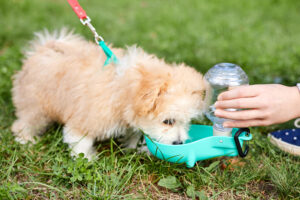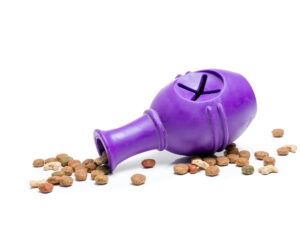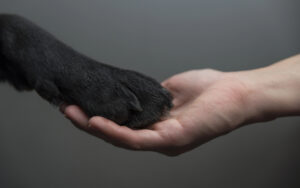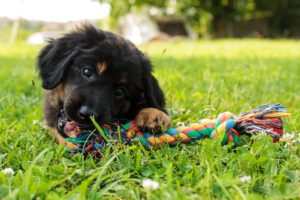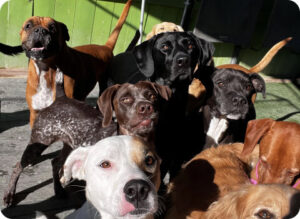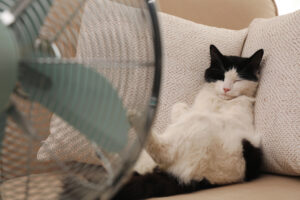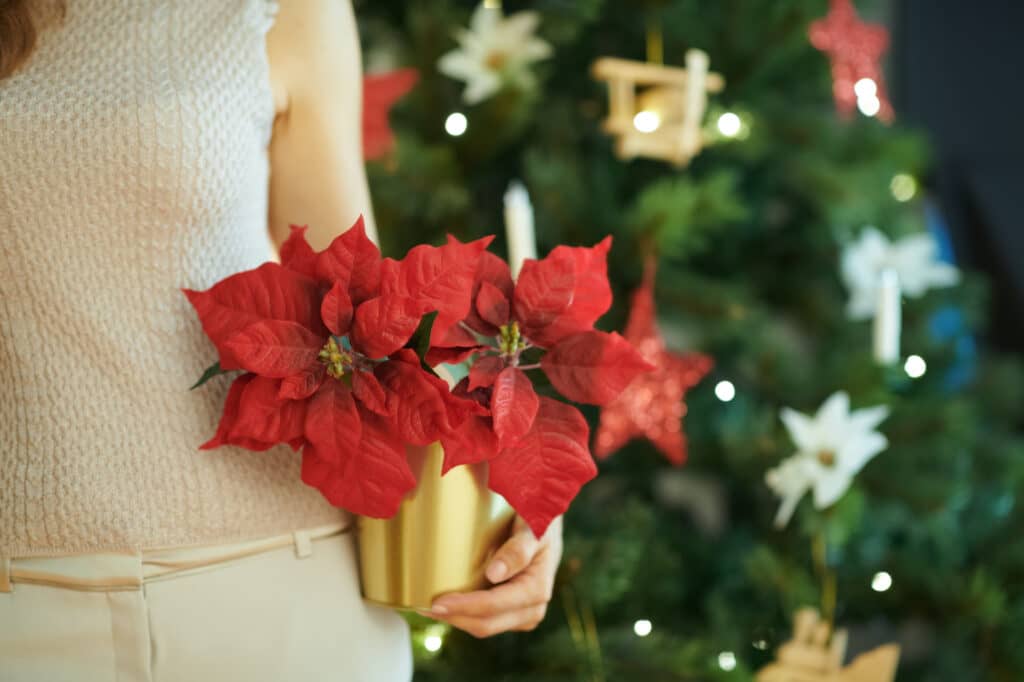
Deck the Halls with Caution: Toxic Holiday Plants for Your Pets
Many people bring seasonal plants into their homes as the holiday season rolls around to help get everyone in the spirit. Unfortunately, not all festive plants are harmless to our pets, and it’s not always easy to tell which ones are potentially dangerous. For example, “Are poinsettia plants toxic to dogs?” questions such as “Is Christmas cactus toxic to canines or felines?” continue to plague pet owners. Getting all the information you need before adding fresh potted plants or wreaths to your home is essential.
If you want to keep your dog or cat safe this holiday season, you must know which common plants are poisonous to them.

Boarding Clients!*Discount does not apply during holiday/peak rate periods.

Holiday Plants Poisonous for Cats and Dogs
Poinsettia
One common holiday plant is the poinsettia (Euphorbia pulcherrima), which has bright red or white blossoms. Poinsettias are not as harmful as the general public thinks. Their milky white secretion may make you gag or throw up, but it usually won’t kill you. Be careful not to irritate your pet’s skin if they come into touch with the sap.
Christmas Cactus
One colorful winter plant is the Christmas cactus or Schlumbergera bridgesii. Although it is not poisonous when consumed, it may induce moderate gastrointestinal distress. For their protection, don’t let your pet chew on it.
Mistletoe
Even though it’s a holiday tradition, dogs and cats shouldn’t be around the poisonous mistletoe (Phoradendron flavescens). Even a little bit can make you sick to your stomach, and if you ingest too much, it can cause serious problems like seizures, low blood pressure, trouble breathing, and possibly death. To avoid any danger, choose fake mistletoe.
Christmas Trees
Christmas trees aren’t inherently poisonous, pets may suffer from skin irritation or gastrointestinal problems if they get their paws on the sap or pine needles. Because tree water can contain bacteria, it is important that pets not consume it. Pine oils are very irritating to felines.
Holly
Holly (Ilex opaca) is a quintessential Christmas decoration, but certain types contain toxic saponins. Symptoms such as lethargy, vomiting, drooling, lip smacking, and discomfort might ensue from ingesting holly.
Christmas Rose
Despite its beauty, the Christmas rose (Helleborus niger) is extremely poisonous to pets. Drooling, vomiting, diarrhea, stomach ache, and lethargy are some of the symptoms that cats and dogs may experience due to the presence of harmful compounds in it.
Lillies
Asiatic lilies, Easter lilies, Stargazer lilies, and many more varieties of lilies are poisonous to cats and other pets. If consumed, any portion of the plant can cause nausea, vomiting, diarrhea, fatigue, loss of appetite, and even changes in the way you urinate. Igniting lily exposure requires immediate veterinarian attention.

What to Do If Your Pet Eats a Toxic Plant
Dogs are social animals, and they can become anxious or bored when left alone for long periods. Daycare socialization provides them with the opportunity to interact with other dogs and humans, which can reduce their anxiety and prevent destructive behaviors like chewing or barking.
Safe Holiday Plants for Pets
Even while it’s vital to keep pets safe, you can keep the party vibe going with plants that are good for pets:
Autumn Olive
Autumn olive, scientifically known as Eleagnus spp., has green foliage and crimson berries; it looks like holly but is harmless to cats and dogs.
Bromeliads
Unlike holly and poinsettia, bromeliads such as blushing bromeliads (Neoregalia spp.) are completely harmless and can be a lovely substitute.
Roses
Roses in all colors, including red and white, are cheerful and non-toxic to pets. Use them instead of poisonous plants like mistletoe or holly.
Rosemary
Topiaries made of rosemary are aromatic and safe to handle. They are a risk-free substitute for real Christmas trees.
Choose seasonal plants that won’t hurt your pets to make sure everyone has a happy and healthy holiday season. Keep yourself educated, make sure your decorations are pet-proof, and have a responsible holiday season!

Pro Tips for Pet-Friendly Holiday Decorating
It takes a little extra effort and consideration when decorating for the holidays to make sure your pets are both happy and secure. Here are a few pointers from the pros to help you out:
- Gather Information Before Decorating: Find out how harmful a plant is to pets before you bring it inside. Being knowledgeable is the initial step in making a space that is pet-friendly, as not all holiday plants are the same.
- Choose Synthetic or Risk-Free Substitutes: Instead of the conventional hazardous Christmas greenery, think about using fake plants or other safe alternatives. For example, the ASPCA and Pet Poison Helpline have both confirmed that rosemary, bromeliads, roses, and autumn olive are not poisonous to pets.
- Bring Decor to New Heights: Keep your plants and other decorations out of your pets’ reach. Be sure to secure even the highest shelves to prevent your cats, who are master climbers, from getting on them.
- Make Christmas Trees Safe: Make sure to secure a live Christmas tree correctly so it doesn’t topple over. To prevent pets from getting beneath the tree, you could install a pet fence or use a tree skirt as a barrier.
- Monitor Water Bowls: If you have live Christmas trees, be sure to watch the water bowls. Tree water isn’t always safe for pets to drink because it contains bacteria, fungi, and fertilizers.
- Avoid Tinsel and Glass Ornaments: Because it is both visually appealing and potentially toxic, tinsel is a major hazard to pets, particularly cats. Avoid breakable glass ornaments and instead choose pet-safe alternatives.
- Be Mindful of Candles: Candles can be very aromatic, so it’s best to keep them in rooms where pets won’t be able to smell them. Keep your pet away from open flames, especially if they are naturally inquisitive.
- Store Chocolate Safely: Keep chocolate in an unreachable location because it is poisonous to pets. Make sure your guests know they shouldn’t give your dogs any holiday goodies.
- Create a Safe Space: When planning your holiday events, think about making sure your pets have a special area just for them. If the celebrations get too much for them, they may always go to this peaceful area, which has a bed, some toys, and water.
- Know the Emergency Numbers: Animal poison control centers’ contact information 888-426-4435 Pet Poison Helpline 855-764-7661 and emergency numbers, such as those for your veterinarian, should be readily available.
You can make your home more festive without sacrificing the security of your dogs by following these expert suggestions for holiday décor. Not only will pet-friendly holiday decorations brighten your home, but they also help keep your pets healthy and happy throughout the season.

Frequently Asked Questions (FAQ)
Are poinsettias toxic to pets?
The prevailing consensus is that poinsettias are somewhat harmful to pets. Severe toxicity is quite unusual, though intake can induce moderate gastrointestinal problems. If you’re looking for a safer plant option, poinsettias aren’t the way to go.
Can Christmas cacti harm my pets?
Christmas cactus isn’t poisonous per se, but it can give your pet a little indigestion. To avoid any negative responses, be cautious and don’t let your pets gnaw on the plant.
Is mistletoe dangerous for pets?
Mistletoe is harmful to pets and can cause symptoms including seizures, low blood pressure, diarrhea, and vomiting if ingested. To eliminate the risk, think about using artificial mistletoe.
Are live Christmas trees safe for pets?
While live Christmas trees don’t pose much of a health risk, eating their needles can lead to indigestion. Make sure the tree is well-anchored, and don’t let pets play in the needles.
Can holly harm my pets?
Certainly, holly is poisonous to animals. Symptoms include nausea, vomiting, diarrhea, and weakness if any component of the plant is consumed. Put up holly decorations in spots where your pets can’t get to them.
Are Christmas roses toxic to pets?
Yes, the poisonous compounds found in Christmas roses can make cats and dogs drool, throw up, have diarrhea, stomach pain, and be lethargic. To protect your pet, make sure they can’t get to them.
Are lilies safe for pets?
No, lilies are extremely poisonous to cats and other pets. Some lily species are known to induce serious allergic reactions, such as the Asiatic, Easter, and Stargazer varieties. It is best to keep lilies away from pets.
What should I do if my pet ingests a toxic plant?
Get your pet to the vet right away if you think it ate a poisonous plant. Animal poison hotline centers such as the ASPCA (888-426-4435) or Pet Poison Helpline (855-764-7661) should be contacted in addition to your veterinarian or emergency clinic if the need arises.




